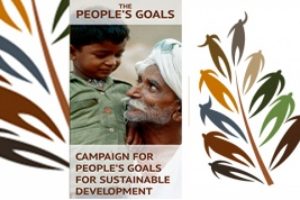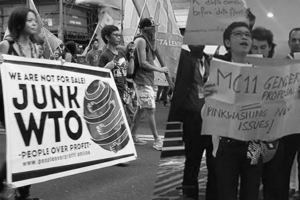Full Text:
On Sustainable Development Finance
Remarks delivered at the ICESDF Session
by Paul Quintos
IBON International
3 March 2014
Thank you co-chairs for this opportunity to share our views on Finance for Sustainable Development. I am from IBON International, and a member of the NGO Major Group from the Philippines.
We all know that the financing requirements for sustainable development is enormous. But we also know the resources are out there. Just 5% of the 45 trillion dollar wealth of the world’s “High Net Worth Individuals” is enough to cover the annual cost of a global social protection floor, climate change adaptation and mitigation combined.[1]
And yet only a small portion, and a declining proportion, of available finance is being invested in the real economy, let alone in poverty eradication and environmental protection. Instead a growing proportion is being invested in speculative and ultimately destabilizing trading of financial assets.
And more resources have been flowing out of developing countries towards the advanced economies in terms of illicit and non-illicit capital flows, debt payments, profit remittances, and so on, compared to the so-called Official Development Assistance (ODA) from the North to the South. Clearly there is a need for fundamental changes in the international economic and financial system if we are to ensure the means for pursuing a sustainable future for all.
First is to reverse the financial liberalization and deregulation that has been promoted by international financial institutions and adopted by governments over the last three decades. Financial liberalization has allowed capital flows to move unrestricted across borders and has encouraged tax competition among countries. Tax rates are lowered for foreign investors in order to attract both portfolio and direct investment. This not only reduces the revenues available for public investment and social spending, it also pushes many developing countries to shift the tax burden from mobile capital to less mobile labor. So financial liberalization and tax competition is exacerbating the fiscal crisis at the same time worsening inequality and social conditions of working peoples throughout the world.
Financial regulation needs to be strengthened including the use of capital controls to regulate cross-border capital movements. Financial institutions should not be allowed to grow too big that their failure becomes a threat to the financial system. Derivatives trading should be strictly regulated and the most risky speculative practices like credit default swaps and naked short selling banned. Shadow banking should have strict reporting requirements and new financial products must go through clearance procedures.
There is a need to pursue international tax cooperation so that governments can coordinate national taxation regimes to ensure, for instance, minimum corporate tax rates and other measures designed to reverse the current “race to the bottom” in the area of taxation. Tax cooperation should also deal with trade mispricing and other tactics used by multinational corporations to help them avoid paying taxes.
Illegitimate and onerous debts – which now saddle developing and developed economies alike – should be cancelled and an independent and fair public debt workout mechanism under the UN should be established to preside over a just and orderly insolvency or debt restructuring process.
Trade and investment agreements should undergo an audit in order to ensure that they do not promote trade liberalization and investors’ rights at the expense of the human rights and the government’s ability to promote social and environmental goals. Of particular concern is the trend towards strengthening investor-state dispute settlement mechanisms, intellectual property rights provisions, privatization and deregulation.
All of these are longstanding systemic issues that undermine the ability of countries, particularly developing countries, to pursue development strategies that would establish a broad and robust domestic industrial base, increase reliance on domestic resources and capabilities, and safeguard the environment to ensure long-term, sustainable, and all-rounded benefits to the people and future generations.
However instead of addressing these systemic issues squarely, the international financial institutions, donors and the corporate sector are approaching the issue of financing sustainable development with the premise that resources can best be mobilized by providing an enabling environment for private sector innovation and investment. Hence the current emphasis on using ODA to leverage private investments or Public-Private Partnerships (PPPs) especially in infrastructure.
And yet there are serious concerns from civil society about this approach, particularly as it socializes the risks involved in such investments with no clear additional benefits to the public compared to other modes of investment, especially for impoverished and marginalized communities. Even in the UK, where there are a lot of PPPs for infrastructure development, there is no strong record of delivering universal, affordable services particularly in the water and social sectors. Indeed 25% of PPPs in the UK have already been terminated.[2]
The fact is there are many options available for raising and strengthening public financing for sustainable development, particularly through progressive redistributive measures, which many of us in civil society believe should be the priority rather than the default reliance on private sector investments or leveraging private finance.
This may include, for instance, financial transactions taxes which has the potential to raise as much as $650 billion[3] a year for governments to tackle poverty, reverse austerity measures and address climate change. It could also help regulate markets by disincentivising the most destabilising trading practices.
Taxing pollution and carbon emissions could potentially raise over $100 billion each year in additional government revenues. The tax would also provide an incentive to use natural resources more efficiently, help encourage the transition towards low-carbon energy technology, and raise significant funding for international climate finance.
Phasing out and rechanneling subsidies from the fossil fuel industry which worsens the climate crisis can raise up to $531 billion.
Phasing out and rechanneling subsidies from agribusiness which reinforce environmentally destructive and socially unjust models of agriculture and trade can raise another $187 billion.
Diverting military spending towards peacekeeping and addressing extreme deprivation and injustice which fuel war and conflict can free up $434.5 billion annually.
Expanding the IMF’s Special Drawing rights with greater allocations to developing countries which has the added benefit of helping correct global economic imbalances. ($115.5 billion).
One can surely add to this list. But whatever “new and innovative sources of finance” are identified, they must be deployed in support of sustainable development for all while prioritizing the needs of the impoverished and marginalized especially in the Global South in line with the Rio principle of Common But Differentiated Responsibility.
The challenge now is for countries—their governments and peoples, and their CSOs as well—to take hold of their own development destiny starting with taking hold of finance rather than being hostage to financial markets and the dictates of the financial elite.
National governments must assert their country’s sovereignty and stake out their sovereign policy space, even as the ICESDF, FFD and other UN processes provide channels for governments to achieve consensus at the global level.
Thank you.
_______________________________________________________________________________________________________
[1] High net worth individuals (HNWI) are defined as those having investable assets of US$1 million or more, excluding primary residence, collectibles, consumables, and consumer durables. According to Capgemini’s World Wealth Report 2013, the aggregate investable wealth of HNWI was US$46.2 trillion in 2012. And this is expected to grow by 6.5% per year to 2015. Download full report at http://www.capgemini.com/resource-file-access/resource/pdf/wwr_2013_0.pdf. According to calculations by the International Labour Organization, less than 2 per cent of the global Gross Domestic Product (GDP) would be necessary to provide a basic set of social security benefits to all of the world’s poor. This is equivalent to $1.47 trillion in 2013. See http:/www3.ilo.org:public:english:protection:secsoc:downloads:1519sp1.pdf Estimates of incremental costs of climate change adaptation in developing countries range from US$4-100 billion per annum. Estimates of incremental investments needed for climate change mitigation range from $69 – 565 billion per annum. See http://www.climatefundsupdate.org/resources/estimated-costs-climate-change
[2] Nancy Alexander (2013). “Responsible Investment in Infrastructure: Recommendations for the G20” Heinrich Böll Stiftung Washington, DC. Downloaded full report at http://www.boell.org/downloads/Responsible_Investment_in_Infrastructure.pdf
[3] Estimates for potential resources from FTT, subsidies, military spending and IMF’s SDR are from Share the Worlds Resources (2012). “Financing the Global Sharing Economy”. Download full report at


